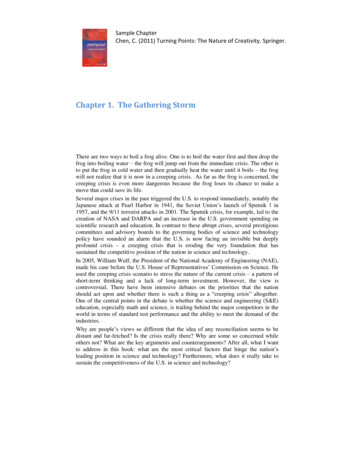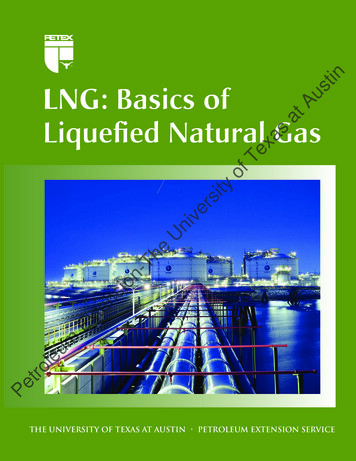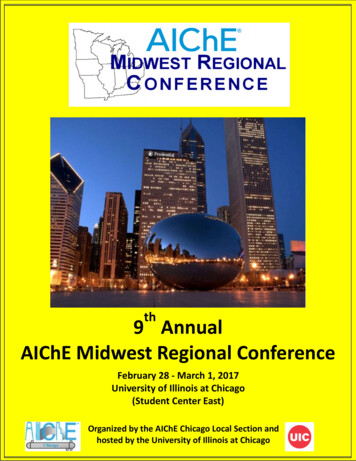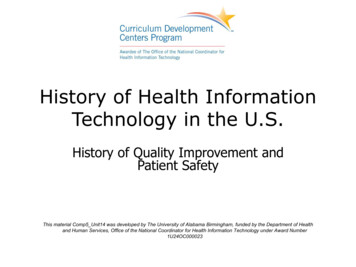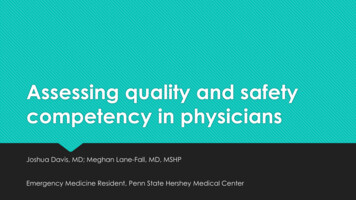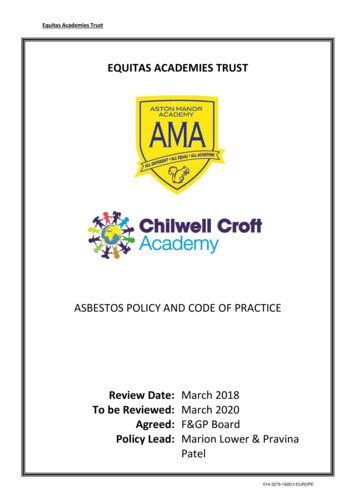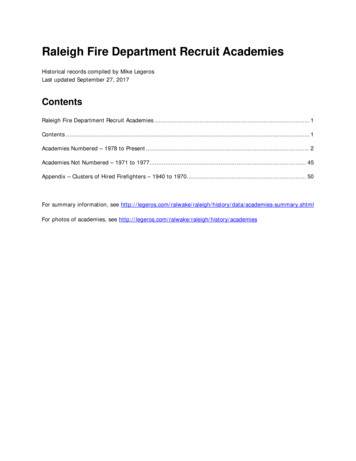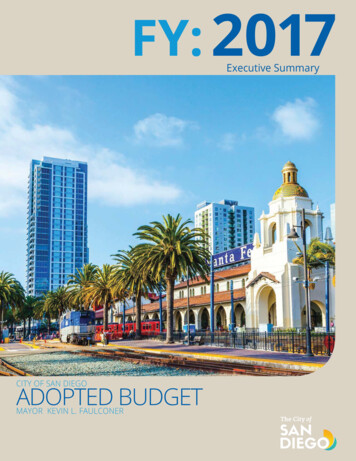
Transcription
THE NATIONAL ACADEMIES PRESSThis PDF is available at http://www.nap.edu/21896SHARE Fostering Integrity in ResearchDETAILS284 pages 6 x 9 PAPERBACKISBN 978-0-309-39125-2 DOI: 10.17226/21896CONTRIBUTORSGET THIS BOOKCommittee on Responsible Science; Committee on Science,Engineering, Medicine, and Public Policy; Policy and Global Affairs;National Academies of Sciences, Engineering, and MedicineFIND RELATED TITLESVisit the National Academies Press at NAP.edu and login or register to get:– Access to free PDF downloads of thousands of scientific reports– 10% off the price of print titles– Email or social media notifications of new titles related to your interests– Special offers and discounts Distribution, posting, or copying of this PDF is strictly prohibited without written permission of the National Academies Press.(Request Permission) Unless otherwise indicated, all materials in this PDF are copyrighted by the National Academy of Sciences.Copyright National Academy of Sciences. All rights reserved.
Fostering Integrity in ResearchCommittee on Responsible ScienceCommittee on Science, Engineering, Medicine, and Public PolicyPolicy and Global AffairsA Report ofPREPUBLICATION COPY—UNEDITED PROOFSCopyright National Academy of Sciences. All rights reserved.
Fostering Integrity in ResearchTHE NATIONAL ACADEMIES PRESS 500 Fifth Street, NW Washington, DC 20001This activity was supported by the Burroughs Wellcome Fund under Grant No. 1012589, theOffice of Inspector General of the National Science Foundation under Contract No.NSFDACS11P1173, the Office of Research Integrity of the U.S. Department of Health andHuman Services under Contract No. HHSP23320042509XI, the Office of Science of the U.S.Department of Energy under Contract No. DE-SC0005916, the U.S. Department of VeteransAffairs under Contract No. VA101-C17404, the U. S. Environmental Protection Agency underContract Nos. EP-C-09-003 and EP-C-09-005, and the U.S. Geological Survey of the U.S.Department of Interior under Contract No. G10AP00150, with additional support from theAmerican Chemical Society, the American Physical Society, the Society for Neuroscience,National Academy of Sciences Arthur L. Day Fund and the W. K. Kellogg Foundation Fund.Any opinions, findings, conclusions, or recommendations expressed in this publication do notnecessarily reflect the views of any organization or agency that provided support for the project.International Standard Book Number-13:International Standard Book Number-10:Digital Object Identifier: https://doi.org/10.17226/21896.Additional copies of this publication are available for sale from the National Academies Press,500 Fifth Street, NW, Keck 360, Washington, DC 20001; (800) 624-6242 or (202) 334-3313;http://www.nap.edu.Copyright 2017 by the National Academy of Sciences. All rights reserved.Printed in the United States of AmericaSuggested citation: The National Academies of Sciences, Engineering, and Medicine. 2017.Fostering Integrity in Research. Washington, DC: The National PREPUBLICATION COPY--UNEDITED PROOFSCopyright National Academy of Sciences. All rights reserved.
Fostering Integrity in ResearchThe National Academy of Sciences was established in 1863 by an Act of Congress, signed byPresident Lincoln, as a private, nongovernmental institution to advise the nation on issuesrelated to science and technology. Members are elected by their peers for outstandingcontributions to research. Dr. Marcia McNutt is president.The National Academy of Engineering was established in 1964 under the charter of theNational Academy of Sciences to bring the practices of engineering to advising the nation.Members are elected by their peers for extraordinary contributions to engineering. Dr. C. D.Mote, Jr., is president.The National Academy of Medicine (formerly the Institute of Medicine) was established in1970 under the charter of the National Academy of Sciences to advise the nation on medicaland health issues. Members are elected by their peers for distinguished contributions tomedicine and health. Dr. Victor J. Dzau is president.The three Academies work together as the National Academies of Sciences, Engineering,and Medicine to provide independent, objective analysis and advice to the nation andconduct other activities to solve complex problems and inform public policy decisions. TheNational Academies also encourage education and research, recognize outstandingcontributions to knowledge, and increase public understanding in matters of science,engineering, and medicine.Learn more about the National Academies of Sciences, Engineering, and Medicine atwww.national-academies.org.PREPUBLICATION COPY—UNEDITED PROOFSCopyright National Academy of Sciences. All rights reserved.
Fostering Integrity in ResearchReports document the evidence-based consensus of an authoring committee of experts.Reports typically include findings, conclusions, and recommendations based on informationgathered by the committee and committee deliberations. Reports are peer reviewed and areapproved by the National Academies of Sciences, Engineering, and Medicine.Proceedings chronicle the presentations and discussions at a workshop, symposium, or otherconvening event. The statements and opinions contained in proceedings are those of theparticipants and have not been endorsed by other participants, the planning committee, orthe National Academies of Sciences, Engineering, and Medicine.For information about other products and activities of the National Academies, please visitnationalacademies.org/whatwedo.PREPUBLICATION COPY--UNEDITED PROOFSCopyright National Academy of Sciences. All rights reserved.
Fostering Integrity in ResearchCOMMITTEE ON RESPONSIBLE SCIENCEROBERT M. NEREM (Chair), Institute Professor and Parker H. Petit Professor Emeritus, Institute forBioengineering and Bioscience, Georgia Institute of TechnologyANN M. ARVIN, Lucile Salter Packard Professor of Pediatrics and Professor of Microbiology andImmunology, Stanford University School of Medicine and Vice Provost and Dean of Research,Stanford UniversityREBECCA M. BERGMAN, President, Gustavus Adolphus CollegeMOSES H. CHAN, Evan Pugh Professor of Physics, Pennsylvania State UniversityC. K. GUNSALUS, Director, National Center for Professional and Research Ethics, Research Professor,Coordinated Science Laboratory, Professor Emerita, College of Business, University of Illinois atUrbana-ChampaignDEBORAH G. JOHNSON, Anne Shirley Carter Olsson Professor of Applied Ethics Emerita, Universityof VirginiaMICHAEL A. KELLER, Ida M. Green University Librarian, Publisher of Stanford University Press,Founder of HighWire Press, Stanford UniversityW. CARL LINEBERGER, E.U. Condon Distinguished Professor of Chemistry and Fellow of JILA,University of ColoradoBRIAN C. MARTINSON, Senior Research Investigator, HealthPartners Institute, Core Investigator,Minneapolis VA, Center for Chronic Disease Outcomes Research, and Associate Professor,University of Minnesota, Department of Medicine.VICTORIA STODDEN, Associate Professor of Information Sciences, University of Illinois at UrbanaChampaignSARA E. WILSON, Associate Professor of Mechanical Engineering, University of KansasPAUL ROOT WOLPE, Asa Griggs Candler Professor of Bioethics, Director, Center for EthicsEmory UniversityLEVI WOOD, Assistant Professor of Mechanical Engineering, Georgia Institute of TechnologyStaffTOM ARRISON, Study DirectorLIDA ANESTIDOU, Senior Program OfficerNINA WARD, Research AssociateNEERAJ GORKHALY, Research Associate (until February 2014)STEVE OLSON, Consultant WritervPREPUBLICATION COPY—UNEDITED PROOFSCopyright National Academy of Sciences. All rights reserved.
Fostering Integrity in ResearchCOMMITTEE ON SCIENCE, ENGINEERING, MEDICINE,AND PUBLIC POLICYRICHARD N. ZARE [NAS] (chair), Marguerite Blake Wilbur Professor, Stanford UniversityCYNTHIA BARNHART [NAE], Chancellor, Ford Professor of Engineering, Department of Civil andEnvironmental Engineering, Massachusetts Institute of TechnologyDAVID E. DANIEL [NAE], Deputy Chancellor, The University of Texas SystemVICTOR J. DZAU [NAM] (ex-officio), President, National Academy of MedicineDIANE E. GRIFFIN [NAS, NAM], Distinguished University Service Professor, W. Harry Feinstone Department ofMolecular Microbiology and Immunology, Johns Hopkins Bloomberg School of Public HealthJOHN G. HILDEBRAND [NAS], Regents Professor, Department of Neuroscience, University of ArizonaJUDITH KIMBLE [NAS], Investigator, HHMI; Professor of Biochemistry and Molecular Biology and MedicalGenetics, University of Wisconsin-MadisonDAVID KORN [NAM], Consultant in Pathology, Massachusetts General Hospital; Professor of Pathology, HarvardMedical SchoolALAN I. LESHNER [NAM], CEO Emeritus, American Association for the Advancement of ScienceMARCIA McNUTT [NAS] (ex-officio), President, National Academy of SciencesRICHARD A. MESERVE [NAE], Senior Of Counsel, Covington & Burling LLPC. D. MOTE, JR. [NAE] (ex-officio), President, National Academy of EngineeringJ. SANFORD SCHWARTZ [NAM], Leon Hess Professor of Medicine, Health Management and EconomicsSchool of Medicine and the Wharton School, University of PennsylvaniaCHRISTOPHER A. SIMS [NAS], Professor of Economics and Banking, Department of Economics, PrincetonUniversityROBERT F. SPROULL [NAE], (Retired Vice President and Director Oracle Labs), Adjunct Professor of ComputerScience, University of Massachusetts at AmherstJAMES M. TIEN [NAE], Distinguished Professor and Dean Emeritus, College of Engineering Electrical &Computer Engineering Department, University of MiamiMICHAEL S. WITHERALL [NAS], Laboratory Director, Lawrence Berkeley National LaboratorySUSAN M. WOLF [NAM], McKnight Presidential Professor of Law, Medicine & Public Policy; Faegre BakerDaniels Professor of Law; Professor of Medicine, University of MinnesotaPETER WOLYNES [NAS], D.R. Bullard-Welch Foundation Professor of Chemistry, Center for TheoreticalBiological Physics-BCR, Rice UniversityStaffANNE-MARIE MAZZA, DirectorKEVIN FINNERAN, Director (until December 2016)GURU MADHAVAN, Program Officer (until November 2010)MARIA LUND DAHLBERG, Associate Program Officer (until September 2016)JAMIE BIGLOW, Senior Program Assistant (until November 2015)NEERAJ GORKHALY, Research Associate (until March 2014)MARION RAMSEY, Administrative Associate (until October 2013)viPREPUBLICATION COPY—UNEDITED PROOFSCopyright National Academy of Sciences. All rights reserved.
Fostering Integrity in ResearchPrefaceSeveral decades ago, a series of highly visible cases of alleged research misconductprompted researchers, research institutions, research sponsors, and others to consider how theymight promote research integrity and address breaches in integrity more effectively. Up to thattime, the research enterprise and its key stakeholders often approached these issues in aninformal and ad hoc manner. Ultimately, the United States and some other countries developedand implemented formal policies and procedures aimed at ensuring that research misconductallegations are investigated, and launched new educational programs in the responsible conductof research. The National Academies of Sciences, Engineering, and Medicine were veryinvolved in these discussions and debates, and have made significant contributions since thattime.In recent years, as ongoing globalization, technological advances, and other shifts havetransformed research, it is clear that the research enterprise faces new and complex challenges infostering integrity and in dealing with the consequences of research misconduct and detrimentalresearch practices. Serious cases of research misconduct—including some that have goneundetected for years—continue to emerge with disturbing regularity in the United States andaround the world. Increases in the number and percentage of research articles that are retractedand growing concern about low rates of reproducibility in some research fields raise questionsabout how the research enterprise can better ensure that investments in research produce reliableknowledge.It is necessary for all of us involved in performing, managing, funding, andcommunicating research to commit to improving practices in our own organizations anddisciplines as well as more broadly. Key areas of focus include institutional efforts to sustainresearch environments conducive to integrity, greatly expanded sharing of data and code, morecomplete reporting of results, more responsible approaches to scholarly publishing, betterunderstanding of the causes and consequences of breaches in integrity, and clearer standards forauthorship. While this report provides a framework and rationale for positive change, collectiveaction on the part of the community will be necessary to push forward toward a research futurecharacterized by greater integrity and quality.I am very grateful to the committee for dedicating considerable time and effort to aproject that turned out to be more difficult and time-consuming than anticipated. The expertswho shared their knowledge and experience with us made a central contribution to our effort. Weare also grateful to the project’s sponsors, who recognized the importance of these issues.Finally, the staff members of the National Academies of Sciences, Engineering, and Medicinewho worked with us were essential to performing this study, particularly Tom Arrison who hasbeen the “heart and soul” of the project.Robert M. Nerem, ChairviiPREPUBLICATION COPY—UNEDITED PROOFSCopyright National Academy of Sciences. All rights reserved.
Fostering Integrity in ResearchAcknowledgmentsThis report was reviewed in draft form by individuals chosen for their diverseperspectives and technical expertise. The purpose of this independent review is to provide candidand critical comments that will assist the institution in making its published report as sound aspossible and to ensure that the report meets institutional standards for objectivity, evidence, andresponsiveness to the study charge. The review comments and draft manuscript remainconfidential to protect the integrity of the deliberative process. We wish to thank the followingindividuals for their review of this report:We wish to thank the following individuals for their review of this report: Bruce Alberts,University of California, San Francisco; David Allison, University of Alabama, Birmingham;Stephanie Bird, Science and Engineering Ethics; Clyde Briant, Brown University; PhilipCampbell, Nature; Claude Canizares, Massachusetts Institute of Technology; Arturo Casadevall,Johns Hopkins University; Peggy Fischer, National Science Foundation (retired); John Galland,University of Hawaii; Cato Laurencin, University of Connecticut; Willem Levelt, Max PlanckInstitute for Psycholinguistics; Melanie Loots, University of Illinois; Marcia McNutt, AmericanAssociation for the Advancement of Science; Barbara Redman, New York University; DorothyRobinson, Yale University; Norman Sleep, Stanford University; Elizabeth Wager, University ofSplit, Croatia; and Joanne Waldstreicher, Johnson & Johnson.Although the reviewers listed above provided many constructive comments andsuggestions, they were not asked to endorse the conclusions or recommendations nor did theysee the final draft of the report before its release. The review of this report was overseen byGeorges C. Benjamin (American Public Health Association) and David Korn (MassachusettsGeneral Hospital and Harvard University). They were responsible for making certain that anindependent examination of this report was carried out in accordance with institutionalprocedures and that all review comments were carefully considered. Responsibility for the finalcontent of this report rests entirely with the authoring committee and the institution.viiiPREPUBLICATION COPY—UNEDITED PROOFSCopyright National Academy of Sciences. All rights reserved.
Fostering Integrity in ResearchContentsSummaryPart One:123Part Two:45678Part Three91011AppendixesABCDE1The Integrity of ResearchIntroductionFoundations of Integrity in Research: Core Valuesand Guiding NormsImportant Trends and Challenges in the Research Environment91121Research Misconduct and Detrimental Research PracticesContext and DefinitionsIncidence and ConsequencesUnderstanding the CausesAddressing Research Misconduct and DetrimentalResearch PracticesExploring New Approaches4547637587Fostering Integrity in ResearchIdentifying and Promoting Best Practices forResearch IntegrityEducation in the Responsible Conduct of ResearchFindings and Recommendations135Biographical Information on the Committee and StaffAgendas from Open Committee SessionsAssessing the Effectiveness of Responsible Conductof Research Training: Key Findings and Viable Procedures,by Michael D. MumfordDetailed Case HistoriesBibliographyixPREPUBLICATION COPY—UNEDITED PROOFSCopyright National Academy of Sciences. All rights reserved.31123137165175193195205209227247
Fostering Integrity in ResearchCopyright National Academy of Sciences. All rights reserved.
Fostering Integrity in ResearchSummaryThe scientific research enterprise is a cornerstone of modern society. In the United Statesalone, the public and private sectors invest hundreds of billions of dollars and countless hours ofhighly skilled labor into the generation, validation, and dissemination of new knowledge everyyear. This investment delivers enormous benefits to society in the form of better health,enhanced understanding of the natural world, and new technologies that boost economic growthand improve life in myriad ways.The integrity of knowledge that emerges from research is based on individual andcollective adherence to core values of objectivity, honesty, openness, fairness, accountability,and stewardship. When researchers commit research misconduct or engage in other behavior thatclearly damages research—what this report terms detrimental research practices—they strayfrom the norms and appropriate practices of science. Yet the research process itself, including itssystem of incentives, goes beyond the actions of individual researchers. Integrity in researchmeans that the organizations in which research is conducted encourage those involved toexemplify these values in every step of the research process: planning, proposing, performing,and reporting their work; reviewing proposals and work by others; training the next generation ofresearchers; and maintaining effective stewardship of the scholarly record.The research enterprise is a complex system that includes universities and other researchinstitutions that educate, employ, and train researchers; the federal, foundation, and industrialsponsors of research; science, engineering, technology, and medical journal and book publishers;and scientific societies. These organizations can act in ways that either support or undermine theintegrity of research.For example, research institutions may—or may not—create and maintain researchenvironments that support integrity, including the policies and capabilities needed to respondresponsibly to allegations of research misconduct. Science, engineering, technology, and medicaljournal and book publishers may provide high levels of rigor in review of manuscripts, or theymay put pressure on prospective authors to add citations to manuscripts to improve a journal’sscore on a bibliometric indicator. Fields and disciplines may take on as a community the task ofdefining and upholding necessary standards in areas such as data sharing, or they may fail to doso and, in effect, tolerate detrimental research practices.Evidence accumulated over the past several decades, and particularly the past severalyears, provides strong support for the proposition that failing to define and respond strongly toresearch misconduct and detrimental research practices constitutes a significant threat to theresearch enterprise. This evidence is discussed mainly in Chapter 5 and Chapter 7. Highly visibleresearch misconduct cases continue to appear regularly around the world. Appendix D describesseveral case studies of the multilayered challenges facing the U.S. research enterprise infostering research integrity. Addressing threats to this integrity requires a contemporaryunderstanding of the research system and challenges to the integrity of that system.Concerns about scientific research that have emerged in the scientific and general mediaover the past several years reinforce the need to rethink and reconsider the strategies used tosupport integrity in research environments, including those used to prevent and address researchmisconduct and detrimental research practices. A growing body of evidence indicates thatsubstantial percentages of published results in some fields are not reproducible; this lack of1PREPUBLICATION COPY—UNEDITED PROOFSCopyright National Academy of Sciences. All rights reserved.
Fostering Integrity in Research2FOSTERING INTEGRITY IN RESEARCHreproducibility appears to have many causes, ranging from essential aspects of the researchprocess or differences in procedures to research misconduct or detrimental research practices.There also has been a remarkable increase in the number of retractions of journal articles, withanalyses showing that a significant percentage of these retractions are due to researchmisconduct (Fang et al., 2012; Steen et al., 2013; Grieneisen and Zhang, 2012). The increase inretractions does not necessarily indicate that the incidence of misconduct is also increasing; otherfactors such as more vigilant scrutiny by the community and retractions becoming a morecommon practice among journals may be contributing factors. New forms of detrimentalresearch practices are also appearing, such as “predatory” journals that do little or no editorialreview or quality control of papers while also charging authors substantial fees and predatoryconferences that charge researchers to speak at conferences that subsequently are cancelled.The research environment continues to change in significant ways that affect efforts tofoster research integrity. Longstanding trends include growth in the size and scope of theresearch enterprise, the expansion of regulatory requirements, and an increased emphasis onindustry sponsorship and entrepreneurial research. In addition, several important newer trendshave emerged, including the pervasive and growing importance of information technology inresearch, the globalization of research, the increasing relevance of knowledge generated incertain fields to policy issues and political debates, and a pervasive media environment that canhelp generate and spread findings and controversies. These changes have led to important shiftsin the institutions that support and underlie the research enterprise, such as science, engineering,technology, and medical publishing.In assessing the trends and phenomena discussed above, along with possible newapproaches, this report does not conclude that the research enterprise is broken. However, theresearch enterprise faces serious challenges in creating the appropriate conditions to foster andsustain the highest standards of integrity. To meet these challenges, deliberate steps must betaken to strengthen the self-correcting mechanisms that are an implicit part of research. Therecommendations presented below are intended as a start to this process.BACKGROUND OF THE STUDYSeveral decades ago, prompted by a series of high-profile cases where data fabrication,falsification, and plagiarism were alleged and investigated, the U.S. research enterprise began toinstitute new approaches aimed at strengthening the capacity of researchers and researchinstitutions to foster integrity and to address research misconduct. These approaches included thedevelopment of training materials and programs in the responsible conduct of research andformal federal oversight of research misconduct investigations affecting federally funded work.As part of these efforts, the Committee on Science, Engineering, and Public Policy(COSEPUP) of the National Academy of Sciences, the National Academy of Engineering, andthe Institute of Medicine formed a panel to undertake a major study of issues related to scientificresponsibility and the conduct of research. Completed in 1992, Responsible Science: Ensuringthe Integrity of the Research Process recommended steps for reinforcing responsible researchpractices (NAS-NAE-IOM, 1992). The report also developed a framework to distinguish threecategories of behaviors that can compromise the integrity of the research process. Misconduct inscience was defined as “fabrication, falsification, or plagiarism in proposing, performing, orreporting research.” Questionable research practices were defined as “actions that violatetraditional values of the research enterprise and that may be detrimental to the research process.”PREPUBLICATION COPY—UNEDITED PROOFSCopyright National Academy of Sciences. All rights reserved.
Fostering Integrity in ResearchSUMMARY3Other misconduct was defined as “forms of unacceptable behavior that are clearly not unique tothe conduct of science, although they may occur in the laboratory or research environment.” Theunified federal policy adopted in 2000 uses a definition of research misconduct that largelyreflects the recommendations of the COSEPUP panel.Several years ago, COSEPUP commissioned a new committee to prepare a secondedition of Responsible Science. In undertaking this effort, it became clear to the committee thatchanges in the research environment and the extent of the current challenges posed by researchmisconduct and other detrimental research practices that clearly damage research required thedevelopment of a substantially new report.RECOMMENDATIONSWhile reaffirming the central recommendation from Responsible Science that formallyplaces the primary responsibility for strengthening the responsible conduct of research onindividual researchers and research institutions, the committee also believes that the integrity ofresearch depends on creating and maintaining a system and environment for research in whichinstitutional arrangements, practices, policies, educational programs, and incentive structuressupport responsible conduct.The committee also endorses the definition of research misconduct recommended inResponsible Science, while recommending refinements and harmonization of the definition andits use. The committee believes that many of the practices that have been categorized up to nowas questionable research practices, such as the misleading use of statistics that falls short offalsification and failure to retain sufficient research data, should be recognized as detrimental toresearch. Detrimental research practices also should be understood to include irresponsible orabusive actions taken by research institutions and journals in addition to the actions of individualresearchers.RECOMMENDATION ONE: To better align the realities of research with its values andideals, all stakeholders in the research enterprise—researchers, research institutions,research sponsors, journals, and societies—should significantly improve and update theirpractices and policies to respond to the threats to research integrity identified in thisreport.Lack of attention to or tolerance of detrimental research practices by stakeholders makesit difficult to expose misconduct, wastes human and financial resources, impairs the overallquality of research, and diminishes public trust in science. In addition, weaknesses in the systemfor identifying, investigating, and addressing research misconduct—most notably unevenness inthe policies and capabilities of research institutions and science, engineering, technology, andmedical journal and book publishers—create barriers to uncovering misconduct and takingappropriate action. Similarly, in industry-performed or industry-sponsored research, pressuresassociated with regulatory approvals or commercial release may create disincentives for full datatransparency or biases that favor conclusions of safety and efficacy. Finally, changes in theresearch environment such as technological advances and globalization are making it moredifficult and complex for all stakeholders in the enterprise to update and ensure adherence to bestpractices.PREPUBLICATION COPY—UNEDITED PROOFSCopyright National Academy of Sciences. All rights reserved.
Fostering Integrity in Research4FOSTERING INTEGRITY IN RESEARCHThe checklists presented in Chapter 9 should form the basis of strategies to refine andimplement best practices by researchers, research institutions, research sponsors, journals, andsocieties.RECOMMENDATION TWO: Since research institutions play a central role in fosteringresearch integrity and addressing current threats, they should maintain the higheststandards for research conduct, going beyond simple compliance with federal regulationsin undertaking research misconduct investigations and in other areas.The key responsibilities for research institutions fall into four areas. The first is creatingand sustaining a research culture that fosters integrity and encourages adherence to bestpractices. This includes maintaining education and training efforts that support a culture ofintegrity, consistent with the current state of knowledge (see Recommendation Ten).A second task is monitoring the integrity of research environments. Such monitoring iscritical to further advance understanding of how institutional structure, context, and incentivesinteract to buttress or detract from research integrity. Research organizations have an obligationto assess, monitor, and work to implement improvements to their research environments. Whereinstitution-wide assessments identify units with particularly strong integrity environments, theyshould be examined and their practices should be disseminated and emulated.The third institutional responsibility is ensuring that resear
Additional copies of this publication are available for sale from the National Academies Press, 500 Fifth Street, NW, Keck 360, Washington, DC 20001; (800) 6246242 or (202) 3343313;



